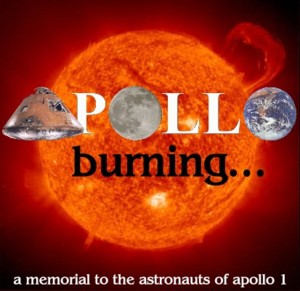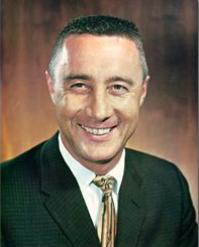 Gus
Grissom: the name itself represents different things to different
people. What went wrong with Gus Grissom's life and career?
Was he a national hero, worthy of the respect and admiration of his colleagues
and the public, or was he purposely maligned by the media, shamelessly
pursued in all aspects of his private and public life? Was he a victim
of himself or a victim of other forces? Or was he a victim at all? Gus
Grissom: the name itself represents different things to different
people. What went wrong with Gus Grissom's life and career?
Was he a national hero, worthy of the respect and admiration of his colleagues
and the public, or was he purposely maligned by the media, shamelessly
pursued in all aspects of his private and public life? Was he a victim
of himself or a victim of other forces? Or was he a victim at all?
On January 27, 1967, the world lost the opportunity to ever ask Gus Grissom what he thought about his situation. He perished in a fire atop what was to be Apollo 1 at Cape Canaveral, Florida. Even in death, Grissom is still tormented by those who would believe that he did not live up to his country's expectations, not to mention his own expectations. Born in Mitchell, Indiana, on April 3, 1926, Gus would grow up in that small, Midwestern town yearning to "prove I could do things as well as the big boys." Known as "Greasy Grissom" in those days, Gus was always small for his age and was known even then as a perfectionist, for working twice as hard to do things the right way. Gus always had big dreams of being a pilot some day, but not having the money to go to college pretty much ruled that out. To solve this problem, he enlisted as an aviation cadet in 1944, but was discharged from the Air Force before he had won his wings. His service time, however, enabled him to pay for college and get a bachelor's degree in mechanical engineering at Purdue University, which in turn set him up to be commissioned in the Air Force and finally learn to fly. Learning to fly had its cost, however. Gus ended up flying over 100 difficult combat missions in an F-86 in Korea. This distinguished flying career eventually led to his selection as a test pilot, which would bring him to the attention of NASA. He was selected as one of the seven original Mercury Astronauts in 1959.
This was only the beginning of Gus's media woes. The press hounded him mercilessly, and Gus underwent an inquiry by NASA as to the loss of the spacecraft. Although his fellow astronauts supported him in every way, and the inquiry led to the eventual conclusion that the explosive hatch blew of its own accord, Gus never recovered his stature with the public or the media. Much to his chagrin, the exhaustive testing done on similar spacecraft with the same explosive bolts yielded no explanations for the premature explosion, as the bolts never again exploded prematurely in any testing. Gus went to his grave unflaggingly insisting that he did not "screw the pooch," which was test pilot jargon for submitting to panic. "I didn't do anything. I was just lying there and it just blew, said Grissom." However, the media painted him as a failure, a coward who panicked and blew the hatch in an attack of claustrophobia. "I was lying there minding my own business when I heard a dull thud," Grissom later said to the media. Even after his death, perhaps because he was an easy target and could not defend himself, the public opinion of Gus was still questionable. In the book and the movie, "The Right Stuff," Tom Wolfe portrays Gus as "the goat among the astronauts, a hard-drinking, hard-living type who courts the favors of barmaids with gewgaws he promises to carry into space. He is also held up to the world as a man who screwed up, who panicked, blew the explosive hatch off his capsule and allowed it to sink to the ocean floor after reentry." Wolfe described the scene at Edwards Air Force Base after Gus's Liberty Bell 7 flight as such: "And at Edwards . . . the True Brothers [test pilots who were not selected for the astronaut program]. . . well, my God, as you can imagine, they were . . . laughing! Naturally they couldn't say anything. But now - surely! - it was so obvious! Grissom had just screwed the pooch!" Gus's luck was better on his second space flight. Selected to command the Gemini 3 mission shortly after his completion of the Mercury 7 flight, he would be the first man ever to fly twice in space. Gus had yet to live down his reputation
with the loss of his Liberty Bell capsule. Given the responsibility
of naming his next capsule, Gus said, "I'd been accused of being
more than a little sensitive about the loss of my Liberty Bell 7, and it
struck me "The press, which already viewed Gus Grissom as Peck's bad boy, jumped gleefully upon this episode which interrupted the crisp rigidity of the official flight plan. Gus was mildly rebuked when he got home, though not as sharply as the press indicated. Betty worried about the sandwich more than any other episode in the Gemini 3 flight. Always fiercely defensive of her husband and his work, she was concerned that this would open him up to a new wave of undeserved criticism." However, NASA seemed to forget and forgive this small discrepancy. After his successful flight with the Molly Brown, Gus was notified confidentially by NASA that he was chosen to be the first man to set foot on the moon. Project Apollo was now underway, and Gus, along with Ed White and Roger Chaffee, were selected for the first mission.
Dr. John McCarthy, director of research,
engineering, and testing for North American, the aerospace company primarily
responsible for building the Apollo capsule, laid the blame literally at
Gus's feet. His hypothesis was that the command pilot might have
kicked or scuffed a wire lead connected to an air-sampling instrument.
"[I]t took a moment for the full implication to sink in - that Grissom's own carelessness caused his and his colleagues' deaths. The suggestion immediately recalled another incident during Grissom's first space flight in July, 1961, when the hatch of his Liberty Bell 7 Mercury spacecraft blew off in the water after landing. The spacecraft sank in the ocean, only to be retrieved 38 years later, and Grissom nearly drowned. McDonnell Aircraft Co., the spacecraft manufacturer, faced with a charge that something had gone wrong with explosive charges on the hatch, tried to show that Grissom, supposedly in panic, had blown the hatch himself." Unfair as this observation obviously was, it was rescinded almost immediately when McCarthy could not find proof to support his hypothesis. Grissom would have had to have been a "contortionist" to have reached the particular wire and create enough force to move it. Is it fair to Gus Grissom's memory to be remembered as the one who "screwed the pooch?" Or as the one who defied orders and ate "real food" aboard a Gemini mission? Did he do anything to deserve accolades for in his astronaut career at all? Betty Grissom sued North American Rockwell several years after her husband's death. This lawsuit was settled out of court after several years of litigation for $350,000, although the amount requested in the lawsuit was ten million dollars. The grounds Betty sued for were the "pecuniary loss suffered by the survivors in the form of earnings, loss of parental care, guidance and control, and present cash value of the future earning potential." Nothing was mentioned about the slanderous way Gus was treated while he was alive. "There will be risks, as there are in any experimental program, and sooner or later, inevitably, we're going to run head-on into the law of averages and lose somebody. I hope this never happens, and with NASA's abiding insistence on safety, perhaps it never will, but if it does I hope the American people won't feel it's too high a price to pay for our space program. None of us was ordered into manned spaceflight. We flew with the knowledge that if something really went wrong up there, there wasn't the slightest hope of rescue." These were Gus's words to a television reporter just a month before his death. It is fortunate that his fears were unfounded - the space program is still going on in spite of losing seven more astronauts aboard the Space Shuttle Challenger in 1986, ironically nineteen years and one day after the Apollo fire.
copyright
|
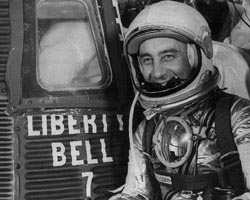 Being
a Mercury Astronaut meant being constantly subjected to scrutiny both by
the public and by the media. Hailed as heroes when the mission went
well, they could equally expect to be chastised for any problems which
might occur along the way. Gus's first space flight, aboard the Mercury
Redstone "Liberty Bell 7," was somewhat less than a complete success.
Although blastoff and re-entry went as expected, upon splashdown in the
Atlantic Ocean, the 70 explosive bolts which held the hatch in place unexplainably
exploded prematurely, forcing Gus to evacuate the capsule and swim for
his life while the rescue helicopter frantically tried to save the capsule
from sinking. It was not successful, and Gus nearly drowned while
the Liberty Bell sank to the bottom of the ocean, never to be recovered.
Being
a Mercury Astronaut meant being constantly subjected to scrutiny both by
the public and by the media. Hailed as heroes when the mission went
well, they could equally expect to be chastised for any problems which
might occur along the way. Gus's first space flight, aboard the Mercury
Redstone "Liberty Bell 7," was somewhat less than a complete success.
Although blastoff and re-entry went as expected, upon splashdown in the
Atlantic Ocean, the 70 explosive bolts which held the hatch in place unexplainably
exploded prematurely, forcing Gus to evacuate the capsule and swim for
his life while the rescue helicopter frantically tried to save the capsule
from sinking. It was not successful, and Gus nearly drowned while
the Liberty Bell sank to the bottom of the ocean, never to be recovered.
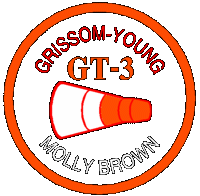 that
the best way to squelch this idea would be to kid it. So John [Young,
co-pilot] and I agreed that we'd christen our baby 'Molly Brown.'"
His mission, with co-pilot John Young was to all observers absolutely
flawless. However, since Gus had complained about the dried food
the astronauts were given to eat aboard space flights, John Young had smuggled
aboard two corned beef sandwiches. Gus at first declined, afraid
that this might mar the mission. Young went ahead and ate his, and
Gus decided it was too good to pass up and took a bite. Crumbs floated
everywhere, and Gus immediately realized the seriousness of the situation
and put his sandwich away. However, via their conversation to each
other, Mission Control caught on to what was happening in space and both
Gus and Young were "mildly rebuked" at the conclusion of their mission.
Betty Grissom put it like this:
that
the best way to squelch this idea would be to kid it. So John [Young,
co-pilot] and I agreed that we'd christen our baby 'Molly Brown.'"
His mission, with co-pilot John Young was to all observers absolutely
flawless. However, since Gus had complained about the dried food
the astronauts were given to eat aboard space flights, John Young had smuggled
aboard two corned beef sandwiches. Gus at first declined, afraid
that this might mar the mission. Young went ahead and ate his, and
Gus decided it was too good to pass up and took a bite. Crumbs floated
everywhere, and Gus immediately realized the seriousness of the situation
and put his sandwich away. However, via their conversation to each
other, Mission Control caught on to what was happening in space and both
Gus and Young were "mildly rebuked" at the conclusion of their mission.
Betty Grissom put it like this:
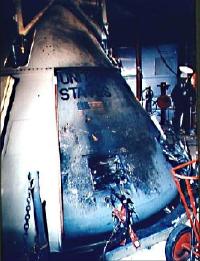 The
astronauts never made it off the ground. On Friday, January 27, 1967,
a fire believed to be caused by an arc of electricity in the pure oxygen
atmosphere of the sealed capsule of Apollo 1 destroyed the capsule and
incinerated all three astronauts. A tragic end to the less-than-enviable
career of Gus Grissom, who even in death was pilloried by the press and
Congress, who held a congressional inquiry as to the cause of the accident.
The
astronauts never made it off the ground. On Friday, January 27, 1967,
a fire believed to be caused by an arc of electricity in the pure oxygen
atmosphere of the sealed capsule of Apollo 1 destroyed the capsule and
incinerated all three astronauts. A tragic end to the less-than-enviable
career of Gus Grissom, who even in death was pilloried by the press and
Congress, who held a congressional inquiry as to the cause of the accident.
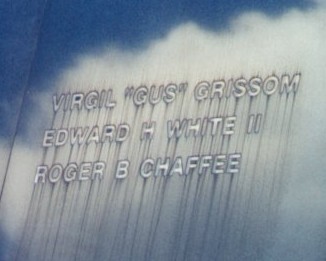 Gus
has been dead nearly 40 years, but his name is in all the history books
with the tag of defeat still beside it. Arguments are still flaring
on the Internet as to whether Gus should be considered "a great man" or
"a coward," and will probably be floating around for the next 40 years
as well. Gus wasn't perfect. But perhaps he should be put to
rest, finally, as a man who accomplished many great things and died tragically
before he could accomplish the greatest of them all, the first steps on
the moon.
Gus
has been dead nearly 40 years, but his name is in all the history books
with the tag of defeat still beside it. Arguments are still flaring
on the Internet as to whether Gus should be considered "a great man" or
"a coward," and will probably be floating around for the next 40 years
as well. Gus wasn't perfect. But perhaps he should be put to
rest, finally, as a man who accomplished many great things and died tragically
before he could accomplish the greatest of them all, the first steps on
the moon.
